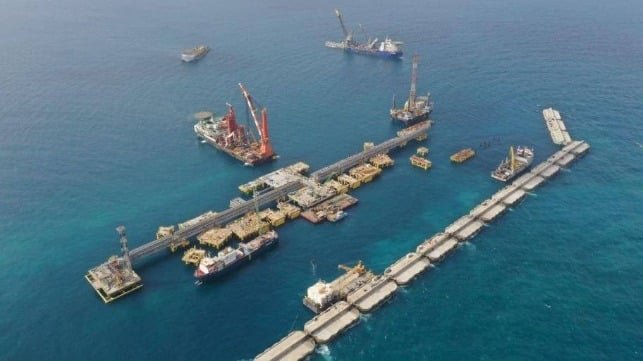Senegal and Mauritania Set to Become Major Gas Producers as BP Announces First Gas Flow
Senegal and Mauritania are on the verge of establishing themselves as major players in the natural gas industry following the recent announcement by oil major BP regarding the commencement of gas flow from the offshore Greater Tortue Ahmeyim (GTA) project.
The GTA project, operated by BP and jointly owned with U.S. operator Kosmos Energy, Mauritanian hydrocarbons company SMH, and Senegal’s state-owned Petrosen, marks a significant milestone in the development of the two West African nations as key hydrocarbon-producing countries.
With an estimated cost of $4.8 billion, GTA is set to be one of the deepest offshore gas developments in Africa, tapping into gas resources located in water depths of up to 2,850 meters. Once fully operational, GTA Phase 1 is projected to produce approximately 2.3 million tonnes of LNG annually for a period exceeding 20 years, positioning it as the first gas development in the new basin offshore Mauritania and Senegal.
The gas extracted from the wells is currently being processed on the floating production storage and offloading (FPSO) vessel, where water, condensate, and impurities are removed before being transferred to the floating LNG vessel for liquefaction. The FPSO, constructed by China’s Cosco Qidong Shipyard, is anticipated to handle over 500 million standard cubic feet of gas per day and will accommodate up to 140 personnel during regular operations.
Subsequently, the liquefied gas will be transferred via pipeline to the Gimi FLNG vessel, stationed at a terminal approximately 10 kilometers offshore. Operated by Golar LNG, the Gimi vessel has a storage capacity of up to 125,000 cubic meters of LNG and is equipped to handle liquefaction, storage, and export operations with a liquefaction capacity of 2.7 million tonnes per annum. The vessel, converted from a Moss-type LNG carrier, underwent conversion at Singapore’s Seatrium shipyard and is designed for extended on-site operations without the need for dry docking.
The commencement of gas flow from the GTA project signals a significant milestone for Mauritania and Senegal as they strive to emerge as key gas production hubs. The first LNG cargo for export markets is anticipated to be dispatched in the first quarter of this year, further solidifying the region’s position in the global energy landscape.
Gordon Birrell, BP’s EVP of production & operations, expressed his enthusiasm for the project, stating, “This is a fantastic landmark for this important megaproject. First gas flow is a material example of supporting the global energy demands of today and reiterates our commitment to help Mauritania and Senegal develop their natural resources.”
BP highlighted the positive impact of the project on the local economies, with over 3,000 local jobs created during the construction phase and engagement with around 300 local companies across both countries.

